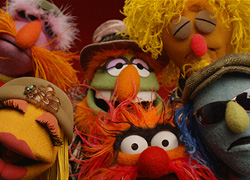newsmanfan
Well-Known Member
- Joined
- Apr 5, 2011
- Messages
- 2,927
- Reaction score
- 1,663
---------------------------
Stephen King still uses his trusty Underwood typewriter, I hear...I like them as art objects but they're too slow for my fingers (I type about 95-110 wpm depending on how tired I am). I gave up writing longhand a looong time ago as my thoughts go too fast for the pen to keep up and it only winds up stifling me. Prefer a laptop computer, preferably Apple (I STILL love Clarisworks, HATE Word); I usually perch with it on my lap in bed. Have to have background music, and I always make a "soundtrack" of specific songs to conjure the mood I wish to put into the piece.
As far as ideas, I tried the "jotting it down when it comes to you" approach but I wound up getting annoyed by it. Now I just let a new idea stew in my head a few days, toying with it like a cat with a new nippy mouse, doing sort of a background-obsessing thing all throughout my day and night until it gels. I find the shower and laying in bed before sleep (when I am physically most relaxed) to be the most productive times in terms of visually, mentally plotting out, blow-by-blow, each scene I wish to work on, and then the next chance I have I put my fingers to work writing it all out (and the scene usually changes a little as I write). I find it best to know my characters really, really well and then just throw a situation at them...they'll react, I'll record! I only get stuck when I'm not sure how to get from point A where the story currently is to point C where it needs to be next...but sometimes (if I'm lucky) the characters themselves will suggest a route.
When you're stuck, I suggest surrounding yourself with images and sounds which are related somehow to your story idea! It may trigger a creative thought.
-------------------------------
Stephen King still uses his trusty Underwood typewriter, I hear...I like them as art objects but they're too slow for my fingers (I type about 95-110 wpm depending on how tired I am). I gave up writing longhand a looong time ago as my thoughts go too fast for the pen to keep up and it only winds up stifling me. Prefer a laptop computer, preferably Apple (I STILL love Clarisworks, HATE Word); I usually perch with it on my lap in bed. Have to have background music, and I always make a "soundtrack" of specific songs to conjure the mood I wish to put into the piece.
As far as ideas, I tried the "jotting it down when it comes to you" approach but I wound up getting annoyed by it. Now I just let a new idea stew in my head a few days, toying with it like a cat with a new nippy mouse, doing sort of a background-obsessing thing all throughout my day and night until it gels. I find the shower and laying in bed before sleep (when I am physically most relaxed) to be the most productive times in terms of visually, mentally plotting out, blow-by-blow, each scene I wish to work on, and then the next chance I have I put my fingers to work writing it all out (and the scene usually changes a little as I write). I find it best to know my characters really, really well and then just throw a situation at them...they'll react, I'll record! I only get stuck when I'm not sure how to get from point A where the story currently is to point C where it needs to be next...but sometimes (if I'm lucky) the characters themselves will suggest a route.
When you're stuck, I suggest surrounding yourself with images and sounds which are related somehow to your story idea! It may trigger a creative thought.

-------------------------------

 Welcome to the Muppet Central Forum!
Welcome to the Muppet Central Forum! Back to the Rock Season 2
Back to the Rock Season 2 Sesame Street Season 54
Sesame Street Season 54 The Muppets Mayhem premieres
The Muppets Mayhem premieres Bear arrives on Disney+
Bear arrives on Disney+ Sam and Friends Book
Sam and Friends Book


